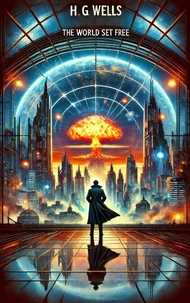The Open Conspiracy
Par :Formats :
Disponible dans votre compte client Decitre ou Furet du Nord dès validation de votre commande. Le format ePub est :
- Compatible avec une lecture sur My Vivlio (smartphone, tablette, ordinateur)
- Compatible avec une lecture sur liseuses Vivlio
- Pour les liseuses autres que Vivlio, vous devez utiliser le logiciel Adobe Digital Edition. Non compatible avec la lecture sur les liseuses Kindle, Remarkable et Sony
 , qui est-ce ?
, qui est-ce ?Notre partenaire de plateforme de lecture numérique où vous retrouverez l'ensemble de vos ebooks gratuitement
Pour en savoir plus sur nos ebooks, consultez notre aide en ligne ici
- Nombre de pages111
- FormatePub
- ISBN859-65--4742239-6
- EAN8596547422396
- Date de parution22/11/2022
- Protection num.Digital Watermarking
- Taille428 Ko
- Infos supplémentairesepub
- ÉditeurDIGICAT
Résumé
In 'The Open Conspiracy, ' H. G. Wells presents a visionary exploration of the future of civilization, weaving together strands of science fiction and political theory. Written in a compelling and accessible style, the book serves as both a manifesto and a cautionary tale, arguing for a collective approach to societal progress in the face of impending global crises. Wells employs incisive prose and vivid imagery to depict both utopian ideals and the potential pitfalls of human nature, advocating for an enlightened global community that transcends national boundaries and historical conflicts.
H. G. Wells, often heralded as the father of science fiction, wrote this work in an era marked by the aftermath of World War I and the burgeoning rise of totalitarian regimes. His experiences as a progressive social thinker and his deep engagement with contemporary challenges, such as class struggle and technological advancement, inform his central thesis in 'The Open Conspiracy.' Wells' commitment to social reform and his belief in science as a means for societal improvement resonate throughout the text, reflecting his profound optimism despite the tumultuous political landscape of his time.
'Conversing with timeless themes of cooperation and globalization, 'The Open Conspiracy' invites readers to ponder the future of human society. This book is essential for anyone interested in the intersections of literature, politics, and philosophy, offering valuable insights that remain relevant in today's world. Wells' blend of speculative thought and practical vision makes this a must-read for enthusiasts of utopian literature and social theory.'
H. G. Wells, often heralded as the father of science fiction, wrote this work in an era marked by the aftermath of World War I and the burgeoning rise of totalitarian regimes. His experiences as a progressive social thinker and his deep engagement with contemporary challenges, such as class struggle and technological advancement, inform his central thesis in 'The Open Conspiracy.' Wells' commitment to social reform and his belief in science as a means for societal improvement resonate throughout the text, reflecting his profound optimism despite the tumultuous political landscape of his time.
'Conversing with timeless themes of cooperation and globalization, 'The Open Conspiracy' invites readers to ponder the future of human society. This book is essential for anyone interested in the intersections of literature, politics, and philosophy, offering valuable insights that remain relevant in today's world. Wells' blend of speculative thought and practical vision makes this a must-read for enthusiasts of utopian literature and social theory.'
In 'The Open Conspiracy, ' H. G. Wells presents a visionary exploration of the future of civilization, weaving together strands of science fiction and political theory. Written in a compelling and accessible style, the book serves as both a manifesto and a cautionary tale, arguing for a collective approach to societal progress in the face of impending global crises. Wells employs incisive prose and vivid imagery to depict both utopian ideals and the potential pitfalls of human nature, advocating for an enlightened global community that transcends national boundaries and historical conflicts.
H. G. Wells, often heralded as the father of science fiction, wrote this work in an era marked by the aftermath of World War I and the burgeoning rise of totalitarian regimes. His experiences as a progressive social thinker and his deep engagement with contemporary challenges, such as class struggle and technological advancement, inform his central thesis in 'The Open Conspiracy.' Wells' commitment to social reform and his belief in science as a means for societal improvement resonate throughout the text, reflecting his profound optimism despite the tumultuous political landscape of his time.
'Conversing with timeless themes of cooperation and globalization, 'The Open Conspiracy' invites readers to ponder the future of human society. This book is essential for anyone interested in the intersections of literature, politics, and philosophy, offering valuable insights that remain relevant in today's world. Wells' blend of speculative thought and practical vision makes this a must-read for enthusiasts of utopian literature and social theory.'
H. G. Wells, often heralded as the father of science fiction, wrote this work in an era marked by the aftermath of World War I and the burgeoning rise of totalitarian regimes. His experiences as a progressive social thinker and his deep engagement with contemporary challenges, such as class struggle and technological advancement, inform his central thesis in 'The Open Conspiracy.' Wells' commitment to social reform and his belief in science as a means for societal improvement resonate throughout the text, reflecting his profound optimism despite the tumultuous political landscape of his time.
'Conversing with timeless themes of cooperation and globalization, 'The Open Conspiracy' invites readers to ponder the future of human society. This book is essential for anyone interested in the intersections of literature, politics, and philosophy, offering valuable insights that remain relevant in today's world. Wells' blend of speculative thought and practical vision makes this a must-read for enthusiasts of utopian literature and social theory.'







